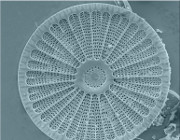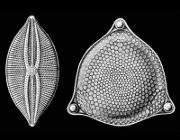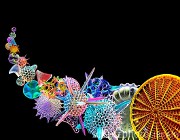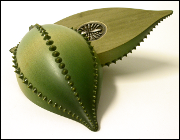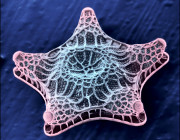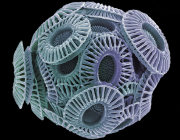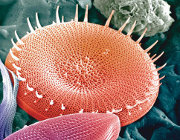Home :: List of Publicly Available Datasets :: Oxyrrhis marina CCMP1795
Oxyrrhis marina CCMP1795
Downloads:
| Principle Investigator(s) | Senjie Lin |
|---|---|
| External sample ID | OxymaSL1 |
| NCGR Sample ID | MMETSP0451_2C |
| Sample accession number | CAM_SMPL_002564 |
| Assembly accession number | CAM_ASM_000382 |
| Combined Assembly Name | Oxyrrhis-marina-CCMP1795 |
| Genus | Oxyrrhis |
| Species | marina |
| Strain | CCMP1795 |
| Clonal | Unknown |
| Axenic | Unknown |
| Prelim. NCBI Taxon ID | 2969 |
| 18S rRNA | |
| Importance of organism and transcriptomes | Oxyrrhis marina represent a unique lineage making it of high interest for a transcriptome study. 1) It represents the most ancient (basal) lineage of common dinoflagellates, and its transcriptome sequences will allow investigation of evolution of molecular machines in the phylum of dinoflagellates; 2) this species is heterotrophic, an important micrograzer in the marine food web. Transcriptome studies will allow search for genes involved in grazing; 3) little work has been done to transcriptomes in heterotrophic dinoflagellates because of inevitable contamination by prey RNA. It is no longer a problem due to the discovery of the specific spliced leader in dinoflagellate mRNA sequences (Zhang et al. 2007 PNAS 104: 4618-4623). Finally transcriptimic data from O. marina will be very useful in studying the radiation of dinoflagellates. |
| Additional citations and references | |
| Environmental Data | |
| Primary citation for organism's characterization, if available | Slamovits,C.H. and Keeling,P.J. 2010. Contributions of Oxyrrhis marina to molecular biology, genomics and organelle evolution of dinoflagellates. J. Plankton Res. doi: 10.1093/plankt/fbq153 |
| Country | UNITED STATES |
| Experimental Data | |
| Date of experiment | 15-APR-11 |
| Growth medium | f/100 amended seawater |
| Temperature (ºC) | 20 |
| Salinty (psu) | 28 |
| pH | 8.1 |
| Light (µmol photons / m2 / sec) | 100 |
| Day portion of day:night cycle in hours | 12 |
| Night portion of day:night cycle in hours | 12 |
| Nitrate (μmol/L) | 17.6 |
| Phosphate (μmol/L) | .72 |
| Trace elements (total) (nmol/L) | .234 |
| Prey organism, if applicable (genus and species) | Dunaliella tertiolecta (CCMP1320) and Synechococcus sp. (CCMP2515) |
| Investigation type | Eukaryotes |
| Other experimental metadata available | submitted is spliced leader-based cDNA |

